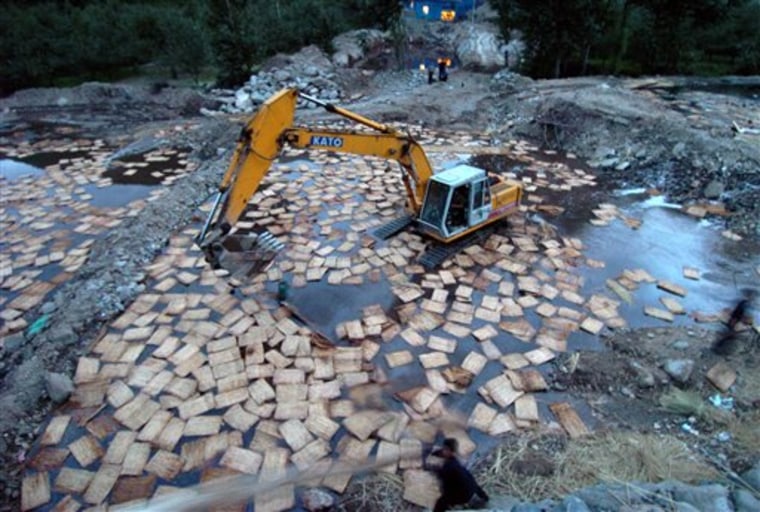A mass of toxic sludge moving down a river in north China appeared to have slowed Friday after fire trucks pumped out the pollution and workers raced to build dozens of makeshift dams.
The spill of 60 tons of coal tar into the Dasha River in Shanxi province earlier this week had reached Fuping County in neighboring Hebei province, where 50,000 residents were told to take water from nearby reservoirs and standby wells, the official Xinhua News Agency said.
Cleanup crews scrambled to build 51 dams to “win time” and absorb the toxic substance before it reached the Wangkuai Reservoir of Baoding, a city of about 10 million people, Xinhua said.
A dozen fire engines pumped polluted water and trucked it away so it could be treated, Xinhua said, without giving details. Cleanup workers also dug holes near the river and diverted the spill into them, it said.
News photos showed a series of the hastily built dams, some no more than a pile of dirt and rubble shoveled into place. Parts of the river still flowed over some of the barriers but appeared considerably slowed. In some spots, there were only small pools of murky water.
Cranes scooped out squares of cotton, sponge, straw and activated carbon, used to absorb the coal tar, a substance linked to increased rates of certain types of cancer after prolonged exposure.
A man who answered the telephone Friday evening at the Baoding Environmental Protection Agency said all officials were in nearby Fuping County, whose 50,000 residents rely on the river for drinking water.
The spill into the Dasha occurred Monday when a truck overloaded with 60 tons of coal tar crashed and dumped its contents into the water. Measurements Friday showed that levels of phenol, also known as carbolic acid, were 100 times greater than acceptable levels in some spots.
It was the latest in a series of mishaps to degrade the country’s already polluted waterways. Officials said there have been at least 76 water pollution accidents in the last six months.
In a separate incident Thursday, a series of explosions rocked the Longxin Chemical Plant in the city of Longquan, Zhejiang province, destroying two factories and threatening to contaminate the Oujiang River, which empties into the East China Sea, Xinhua reported.
One person was injured and two people were reported missing after the blast, it said.
The coal tar spill did not appear to have a major effect on villagers living near the Dasha.
Liu Qing, who lives along the river in Fuping, said by telephone that the water was not discolored and did not have any unusual odor, although she had noticed dozens of dead fish floating in the river this week.
Liu said her family normally drinks water from a well, not the river, so they have not been affected.
Another Fuping resident, Li Xingcui, said that despite seeing several warnings against using river water broadcast by the local TV station, her family was still using it to wash vegetables and bathe. She said the water looked and smelled normal.
Li’s family was taking water from a mountain stream for drinking.
